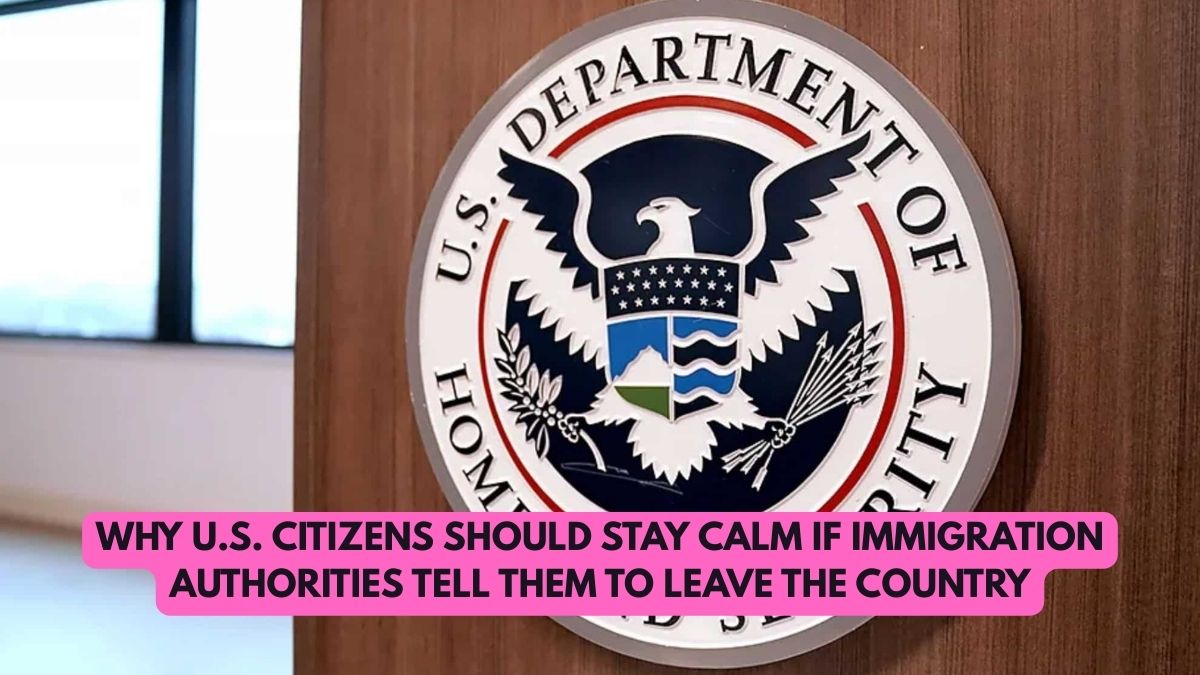In recent news, there have been cases where U.S. citizens mistakenly received notices from immigration authorities asking them to leave the country. This has caused confusion and distress among affected individuals, who were told to self-deport despite their citizenship.
If you ever find yourself in such a situation, it’s essential to remain calm and take immediate steps to rectify the issue. Here’s a guide on what to do if immigration authorities tell you to leave the U.S.
1. Stay Calm and Don’t Panic
The first thing to remember is that U.S. citizens cannot be deported. So, if you receive a notice telling you to leave the country, it’s most likely an error. In a few recent incidents, U.S. citizens were mistakenly sent deportation notices due to administrative mistakes. These situations, although rare, can be overwhelming, but they can usually be resolved quickly with the right approach.

2. Verify the Authenticity of the Notice
If you receive a communication from immigration authorities such as the Department of Homeland Security (DHS), it is crucial to confirm whether the notice is genuine. The government typically sends official notifications through formal channels, which include case-specific details that can be verified.
Be cautious of potential scams—fraudulent emails or letters can look similar to legitimate government communications. You can verify the authenticity of the notice by cross-checking the contact information provided on the letter with the official DHS website. You can visit DHS.gov for more information.
3. Contact a Qualified Immigration Attorney
Receiving a deportation notice can be distressing, but it’s important to seek legal counsel immediately. An immigration attorney specializing in U.S. citizenship laws can provide guidance on how to proceed and clarify your rights. They will be able to determine whether the deportation order was issued mistakenly and assist you in resolving the issue.
In cases where the notice was sent in error, an attorney can help you appeal the decision and take appropriate steps to prevent the situation from escalating. It’s critical to act quickly, as the process of correcting such errors can take time.
4. Contact DHS or USCIS Directly
If you suspect the notice was an error or if you simply want to clarify your status, contact the relevant authorities. The Department of Homeland Security (DHS) or the U.S. Citizenship and Immigration Services (USCIS) can help you understand the situation and guide you on the necessary actions.
Both agencies can be contacted through their official websites for inquiries and assistance.
5. Document Everything
Make sure to keep a record of all correspondence you have with immigration authorities, including letters, emails, phone calls, and any responses. This documentation will be vital if you need to escalate the matter or seek legal intervention.
For example, in a case reported by The Guardian, an immigration attorney mistakenly received a deportation notice. Keeping a thorough record of all interactions helped them prove the error and resolve the situation (The Guardian).
6. Consider Reporting the Incident to Relevant Authorities
If you have confirmed that the notice is an error and you’re unable to resolve the issue directly with DHS or USCIS, consider reporting the incident to a higher authority, such as the U.S. Ombudsman for Immigration Services. This office can help investigate systemic issues or resolve conflicts between citizens and immigration authorities.

Conclusion
While receiving a notice to leave the country can be alarming, U.S. citizens should remain calm and take immediate steps to resolve the issue. By verifying the authenticity of the notice, seeking legal counsel, and contacting DHS or USCIS, you can ensure the situation is corrected swiftly. Remember, U.S. citizens cannot be deported, so the notice you received is likely a mistake that can be fixed.
If you find yourself in such a situation, do not delay. Contact a trusted immigration attorney and take the appropriate steps to protect your rights.
This article has been carefully fact-checked by our editorial team to ensure accuracy and eliminate any misleading information. We are committed to maintaining the highest standards of integrity in our content.

Deepak Grover is a dedicated content writer at OTE News, specializing in government affairs, public policy, and current events. With a keen eye for detail and a passion for factual reporting, he ensures readers receive accurate and insightful news. Deepak holds a degree in Political Science and has experience in research-driven journalism.
When not writing, he enjoys reading historical books, exploring hiking trails, and staying updated with global political trends. His commitment to ethical journalism makes him a trusted voice at OTE News.




